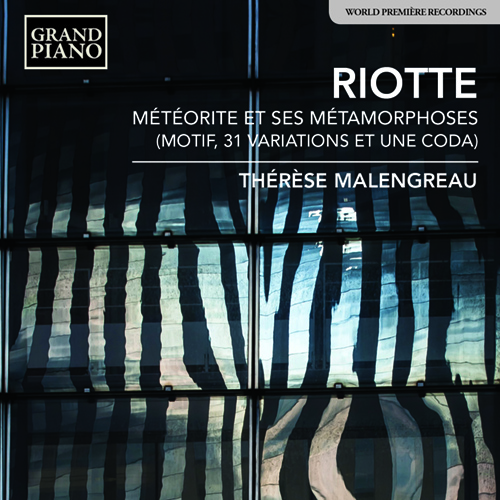
About this Release
RIOTTE, ANDRÉ (1928–2011)
Météorite et ses métamorphoses (Motif, 31 variations et une coda)
- Thérèse Malengreau, piano
French composer André Riotte was closely involved with experiments in avant-garde music, following in the paths of Messiaen, Xenakis and Barraqué, as well as in group improvisation. He wrote widely for orchestral and chamber forces, but the piano was his central focus and his compositions for it chart his development from early neo-modal works through studies in pure sound, to the monumental inspiration of his large-scale works. Météorite et ses métamorphoses, one of the composer’s last works, is a milestone in contemporary repertoire. Thoroughly organic, it develops as metamorphoses – a term Riotte preferred to ‘variations’ – and acknowledges the influence of Debussy, Bach, and Beethoven in his Diabelli Variations.
This recording was made on a modern instrument: Steinway Model D 544020
Tracklist
|
Météorite et ses métamorphoses (2001) (00:55:00 )
|
|
1
Météorite: Massif (00:01:56)
|
|
2
Métamorphose I: *** (00:01:12)
|
|
3
Métamorphose II: En oppositions (00:01:22)
|
|
4
Métamorphose III: Rapide et bien articule (00:00:45)
|
|
5
Métamorphose IV: Avec simplicite, sans effets (00:01:13)
|
|
6
Métamorphose V: Rapide et precis (00:01:10)
|
|
7
Métamorphose VI: Hieratique (00:01:56)
|
|
8
Métamorphose VII: En volutes (00:00:46)
|
|
9
Métamorphose VIII: Colore, en suspens (00:01:12)
|
|
10
Métamorphose IX: *** (00:01:25)
|
|
11
Métamorphose X: Naif (00:01:44)
|
|
12
Métamorphose XI: Tranquille, un peu lourd (00:01:24)
|
|
13
Métamorphose XII: Sinueux (00:01:21)
|
|
14
Métamorphose XIII: Profondement calme et meditatif (00:04:10)
|
|
15
Métamorphose XIV: Staccato vif et vigoureux (00:00:40)
|
|
16
Métamorphose XV: Impulsif (00:01:17)
|
|
17
Métamorphose XVI: Avec fantaisie (00:01:20)
|
|
18
Métamorphose XVII: *** (00:00:36)
|
|
19
Métamorphose XVIII: Rapide, les accents marques (00:00:58)
|
|
20
Métamorphose XIX: Ceremonieux (00:02:15)
|
|
21
Métamorphose XX: Frenetique (00:01:10)
|
|
22
Métamorphose XXI: Tres fondu (00:01:40)
|
|
23
Métamorphose XXII: Avec simplicite mais volubile (00:01:13)
|
|
24
Métamorphose XXIII: Pas vite, en demi-teinte, de plus en plus efface (00:01:50)
|
|
25
Métamorphose XXIV: En rafales - Subitement calme (00:01:23)
|
|
26
Métamorphose XXV: Recueilli (00:03:34)
|
|
27
Métamorphose XXVI: Prestissimo, fluide (00:01:04)
|
|
28
Métamorphose XXVII: Allant, martele (00:00:30)
|
|
29
Métamorphose XXVIII: Rapide, sans rubato - Staccato plus leger, dynamique (00:01:16)
|
|
30
Métamorphose XXIX: Enigmatique et sans espoir, extremement lent (00:01:36)
|
|
31
Métamorphose XXX: Precis (00:02:26)
|
|
32
Métamorphose XXXI: Souple et assez lent - Plus vif - Tres vite - Calme et enveloppe - Detache, martele - Presto (00:06:26)
|
|
33
Coda: Lent et solennel (00:02:07)
|
The Artist(s)

Born into an artistic family, the Belgian pianist Thérèse Malengreau was awarded her first prizes and Advanced Diplomas at the Royal Conservatory of music of Brussels and holds a degree in romance philology from the Université libre de Bruxelles. Her teachers include Nicole Henriot-Schweitzer, Bernard Lemmens, Yevgeni Malinin and Léon Fleisher. She has discovered and given first performances of a number of scores including Andre Riotte’s Météorite et ses metamorphoses, featured on this recording.
The Composer(s)
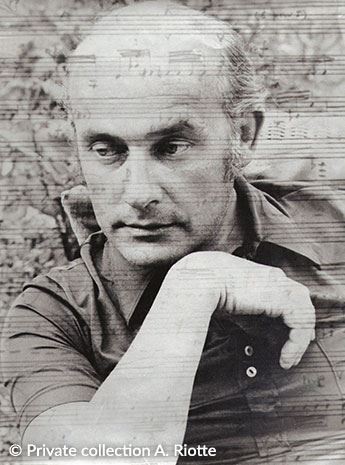 The French composer André Riotte was taught by Arthur Honegger and Andrée Vaurabourg at the École Normale de Musique in Paris, as well as attending classes on musical analysis given by Olivier Messiaen. He studied composition and orchestration with André Jolivet and, later, was greatly influenced by Jean Barraqué and Iannis Xenakis. In parallel with his musical studies, he also trained as an electronics engineer. Until 1982 he worked as both a composer and an engineer, in France, Italy and Belgium. His work as an IT specialist within the then EC (he was director of a data-processing lab at the Euratom Joint Research Centre in Ispra) inspired him to learn more about the formalization of music, in his own works and in more general research terms
The French composer André Riotte was taught by Arthur Honegger and Andrée Vaurabourg at the École Normale de Musique in Paris, as well as attending classes on musical analysis given by Olivier Messiaen. He studied composition and orchestration with André Jolivet and, later, was greatly influenced by Jean Barraqué and Iannis Xenakis. In parallel with his musical studies, he also trained as an electronics engineer. Until 1982 he worked as both a composer and an engineer, in France, Italy and Belgium. His work as an IT specialist within the then EC (he was director of a data-processing lab at the Euratom Joint Research Centre in Ispra) inspired him to learn more about the formalization of music, in his own works and in more general research terms Reviews
“The music is ear opening and will most certainly appeal to the high-modernist audiophile.” – Gapplegate Classical-Modern Music Review

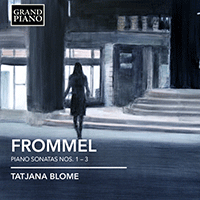
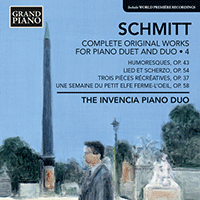
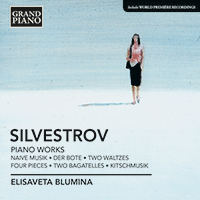
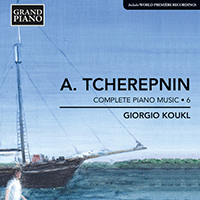
 Grand Piano has gained a reputation for producing high quality recordings of rare keyboard gems. Dedicated to the exploration of undiscovered piano repertoire, the label specialises in complete cycles of piano works by many lesser-known composers, whose output might otherwise have remained unknown and unrecorded.
Grand Piano has gained a reputation for producing high quality recordings of rare keyboard gems. Dedicated to the exploration of undiscovered piano repertoire, the label specialises in complete cycles of piano works by many lesser-known composers, whose output might otherwise have remained unknown and unrecorded.






